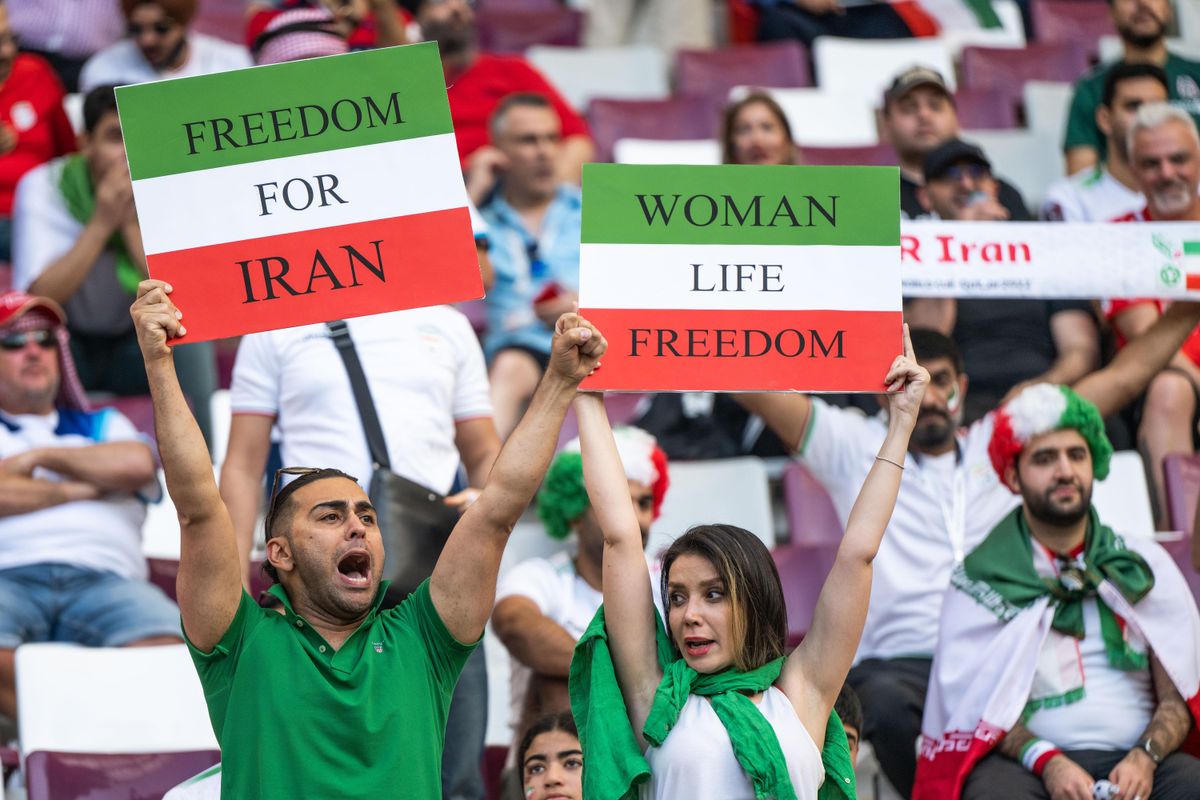The US and Iran go to war Tuesday ... on a soccer pitch. The two sides meet in their last first-round game of the Qatar World Cup, and whoever wins will almost certainly advance to the knockout stage — a first for Iran.
But this time the long-running geopolitical tensions between the two bitter enemies have taken a back seat to the ongoing women-led protests against the theocratic regime in Iran, the biggest the country has seen since the 1979 Islamic Revolution.
Iranian players have been caught in the crossfire. In the lead-up to the tournament, they were bashed by anti-government activists who viewed them as puppets of the ayatollahs. Some prominent figures even called for FIFA to ban Iran from the World Cup over the regime's brutal crackdown. But how things have changed since the ball started rolling in Qatar.
Before their first game against England, Iran’s players grabbed global headlines by staying quiet during their national anthem in solidarity with the protesters. That smoothed things over with their critics but enraged the ayatollahs. The regime responded by warning Team Melli, as the squad is popularly known, to do its patriotic duty in their next match, or else. In the end, they did — albeit without the joy they showed two hours later following an epic injury-time victory over Wales.
Damned if you do, damned if you don’t.Sina Saemian, the Iranian-born UK host of the Gol Bezan soccer podcast, is almost certain that Team Melli will sing the anthem on Tuesday ahead of kickoff. However, he says, there will be zero passion because "whenever you're forced to do something against your will, you'll automatically want to rebel against it."
And it's not just the ayatollahs who are piling on the pressure. If the players stay silent, their families might get arrested; but if they do more than just mumble the lyrics, the side they actually back will resent them for it.
For US-based Dara Zarandi, a contributor to the Team Melli Talk podcast and YouTube show, "the players are in a really, really sensitive and difficult situation. And unfortunately, the people who are [against] the national team either don't acknowledge the reality of the situation or just don't honestly know what's going on behind the scenes."
And what about facing the all-powerful United States, Iran's geopolitical nemesis? Just two months ago, the narrative would have been a death match vs. Great Satan, which is punishing Iran with crippling economic sanctions over its nuclear program.
More recently, though, Saemian says that many Iranians have come to "see that actually, the enemy is within. The enemy is inside." For sure, he adds, they are still wary of the US, but thanks to the protests the "anti-American sentiment has somewhat decreased."
The buzz about the game has hardly been a repeat of France '98, when Iran pulled off a huge upset by defeating the stronger US team by 2-1 and kicking it out of the knockout stage.
Back then, the US government went out of its way to downplay the non-soccer stakes because Washington saw a window of opportunity for warmer ties following the 1997 landslide election of reformist President Mohammad Khatami. Meanwhile, Tehran doubled down on the political drama, dubbing the match the "Mother of all Games." (Not-so-fun fact: At halftime, Iranian officials seized the team's passports to prevent the players from returning home if they lost.)
Now, the Biden administration has been firm in its support for the protesters and USMNT weighed in scrubbing the emblem of the Islamic Republic from Iran's national flag on social media. The regime —which until then had barely mentioned the match, as it was busy arresting and killing demonstrators — responded by demanding FIFA expel the US from the tournament.
Whatever the final result, the politicization of the national soccer squad amid the protests will have staying power — and the anti-government movement only stands to benefit if Team Melli does well in Qatar. For Zarandi, the further the team goes in the tournament, "the more people will be talking about what's going on."
One name to watch is striker Sardar Azmoun, the most outspoken supporter of the protesters. If he scores the winning goal, don't be surprised by a celebration that might win hearts and minds but also have serious consequences for his loved ones.
Throwback: When Iran qualified for its first World Cup in 1978, the country was also in political turmoil — although the mass rallies and strikes against autocratic Shah Mohammed Reza Pahlavi took a summer break that coincided with the tournament. Iran's captain stayed home to protest the shah's repression, the team had a dismal run, and months later Pahlavi was out.
Will history repeat itself?
- US-Iran World Cup sportsmanship amid political tensions - GZERO Media ›
- Why Iranians celebrated their soccer team’s World Cup elimination - GZERO Media ›
- Iran's morality police: not disbanded - GZERO Media ›
- Podcast: After Mahsa Amini: Iran’s fight for freedom, with Masih Alinejad - GZERO Media ›
- Iranian activists want the West to stop legitimizing Iran's regime - GZERO Media ›






